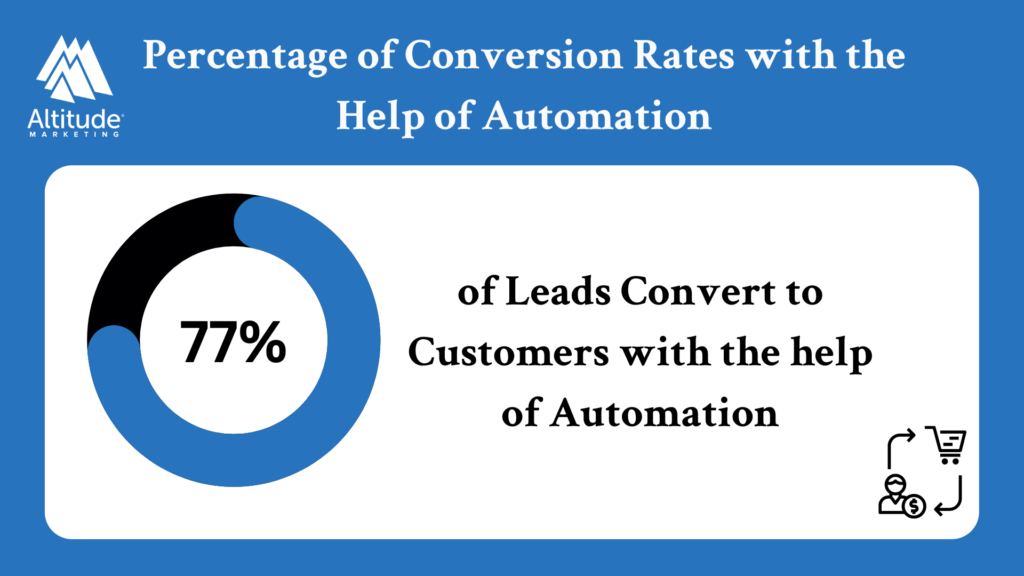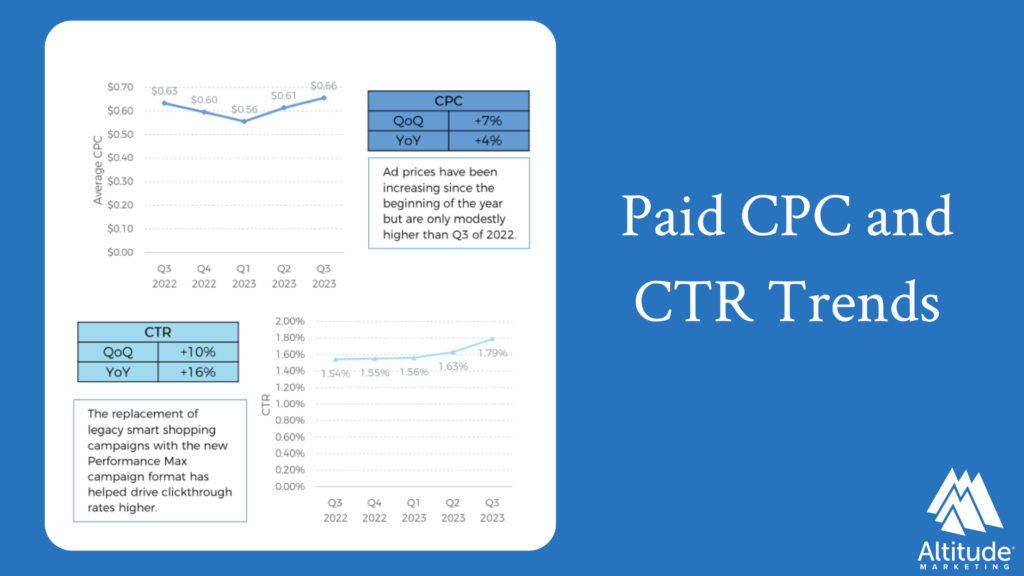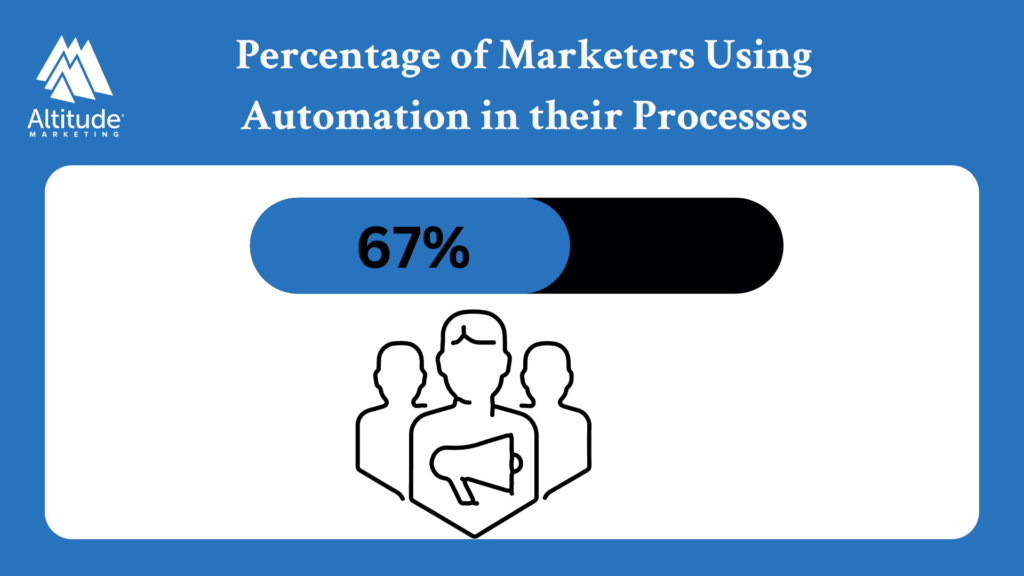For B2B organizations, marketing automation serves as a game-changing strategy for streamlining processes, enhancing efficiency, and driving results. As businesses navigate the complexities of modern marketing, the need for innovative tools and tactics to stay competitive has never been more pressing.
Now in 2024, B2B marketing and account-based marketing automation isn’t simply nice to have. It’s necessary to compete with your peers while boosting efficiency. In this guide, we explore how automation can propel your marketing into a faster, more powerful era.

B2B Marketing Automation: The Best Tools and Tactics for 2024
What is B2B Marketing Automation
Marketing automation has evolved into a cornerstone strategy for businesses looking to streamline their marketing processes, optimize efficiency, and drive ROI. Any task or system that is no longer done manually–from email nurtures to CRM tagging to data capture–is considered part of marketing automation.
Trends and Developments Shaping the Industry in 2024
This year, several key trends and developments are shaping the direction of marketing automation and marketing automation software. These include:
- Еnhanced Personalization: Marketing teams are increasingly leveraging advanced data analytics and AI-driven insights to deliver hyper-personalized experiences tailored to individual preferences and behaviors. Marketing automation software can improve prospect’s relationships based on customer data.
- Integration of Еmerging Technologies: The integration of emerging technologies such as artificial intelligence (AI), machine learning (ML), and predictive analytics is revolutionizing the capabilities of marketing automation platforms, enabling predictive modeling, dynamic content optimization, and advanced lead scoring.
- Focus on Customer Еxperience: With a heightened emphasis on customer-centricity, B2B marketers are prioritizing strategies that prioritize the prospect’s experience, leveraging automation to deliver seamless, omnichannel interactions that drive engagement and loyalty.
- Agile and Adaptive Marketing: Agile methodologies and adaptive marketing strategies are gaining traction, enabling marketers to respond quickly to changing market dynamics, buyer needs, and competitive pressures.
4 Key Benefits of B2B Marketing Automation
1. Increased Lead Generation and Conversion Rates:
B2B marketing automation enables businesses to streamline lead generation processes by automating repetitive tasks such as lead capture, scoring, and segmentation. By leveraging automation tools, marketers can identify and prioritize high-quality leads more efficiently, resulting in a higher volume of the 79% that is expected from standard tactics.
Additionally, automation facilitates personalized lead nurturing campaigns, delivering relevant content and communications to prospects at each stage of the buyer’s journey. By providing timely and targeted interactions, businesses can nurture leads more effectively, ultimately increasing conversion rates and driving revenue growth.
2 . Enhanced Lead Nurturing and Customer Engagement:
B2B marketing automation empowers marketers to deliver personalized and timely communications to leads and prospects across multiple channels, including automated emails, social media, and website interactions. By leveraging automation workflows and drip campaigns, businesses can grow more leads with relevant content, educational resources, and product information, fostering stronger relationships and engaging prospects.
Furthermore, automation enables marketers to track and analyze buyer interactions and behaviors, allowing for more personalized content and contextually relevant communications. By understanding the interests and preferences of leads and new prospects, businesses can tailor their messaging and offers to align with individual needs, driving deeper engagement and loyalty.
3. Improved Marketing and Sales Alignment:
B2B marketing automation facilitates closer alignment between marketing and sales teams by providing shared visibility into lead and buyer interactions. By integrating automation platforms with customer relationship management (CRM) systems, businesses can ensure seamless communication and collaboration between marketing and sales departments.
Automation enables the automatic syncing of lead data and activity tracking, allowing sales teams to access real-time insights into lead behavior and engagement. This alignment between marketing and sales enables more effective lead handoff processes, ensuring that sales teams receive qualified leads at the right time, leading to improved conversion rates and revenue growth.
4. Data-Driven Decision-Making and Performance Tracking:
B2B marketing automation platforms provide robust analytics and reporting capabilities, allowing businesses to track and measure the performance of marketing campaigns, channels, and content assets. By analyzing key metrics such as open rates, click-through rate changes, conversion rates, and revenue attribution, marketers can gain valuable insights into campaign effectiveness and ROI.
Automation also enables A/B testing and experimentation, allowing marketers to optimize campaign elements such as subject lines, content, and calls-to-action based on data-driven insights. By continuously testing and refining marketing strategies, businesses can improve performance over time and drive better results.
Additionally, automation platforms enable marketers to generate comprehensive, valuable data reports and dashboards that provide actionable insights into existing prospects, audience engagement, and revenue impact. By leveraging data-driven decision-making, businesses can allocate resources more effectively, prioritize high-impact initiatives, and drive continuous improvement in marketing programs.
5 Top B2B Marketing Software Services
Еssential tools for B2B marketing automation encompass a diverse range of platforms and technologies designed to streamline and optimize various aspects of the marketing process. These tools enable businesses to automate repetitive tasks, personalize prospect interactions, and analyze campaign performance to drive efficiency and effectiveness in their marketing efforts.
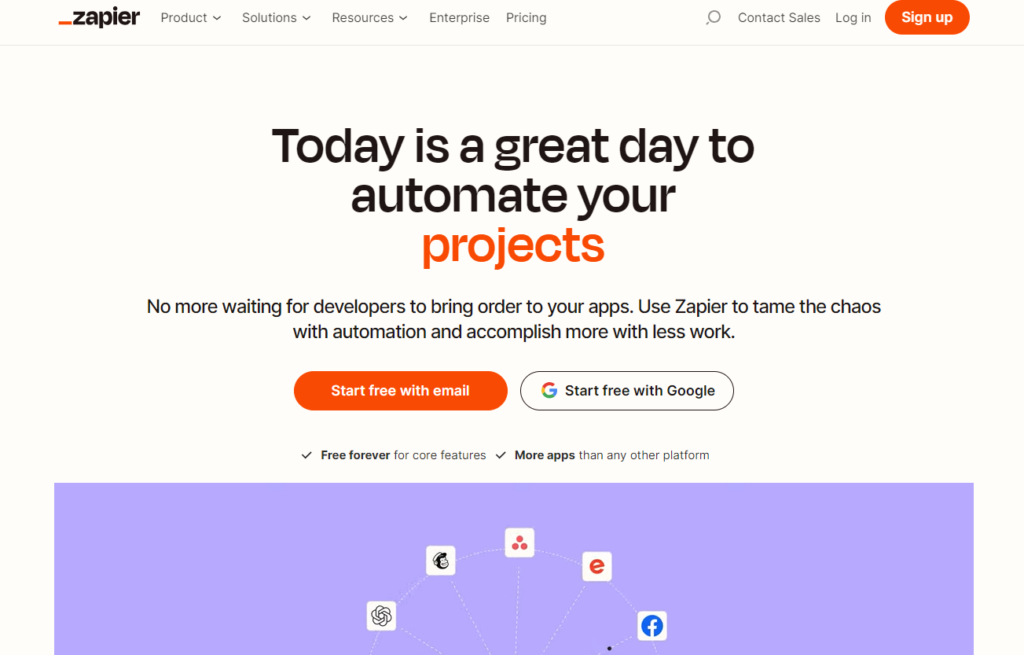
Zapier: With hundreds of integrations into the tools you use every day (like Salesforce, marketing ESPs, Gmail, and more) Zapier is a workflow automation tool that can save your team invaluable time and money. The flexible programming allows you to automate thousands of tasks, with a platform designed to fit your exact needs.

Brevo: The service offers features like email campaign marketing, SMS campaigns, advanced automation workflows, landing pages, signup forms, and CRM software integration. It provides a comprehensive set of tools to streamline marketing efforts and enhance customer engagement. Businesses can then better nurture leads as well as offer better collaboration between businesses.
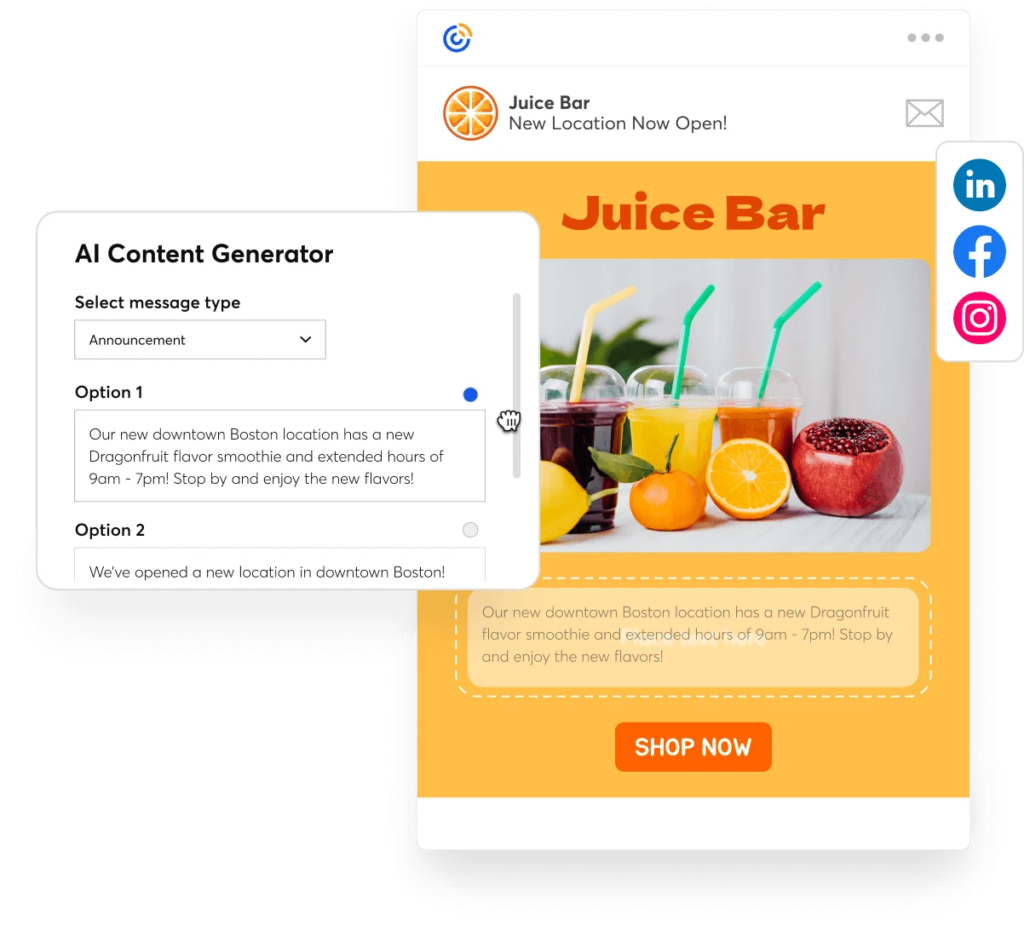
Constant Contact: Provides tools for email campaign responses, onboarding, subscription renewals, and data sorting to automate various marketing functions. It focuses on simplifying email campaigns and automating responses to improve customer engagement. This allows businesses to send out updates to their B2B service prospects easily.
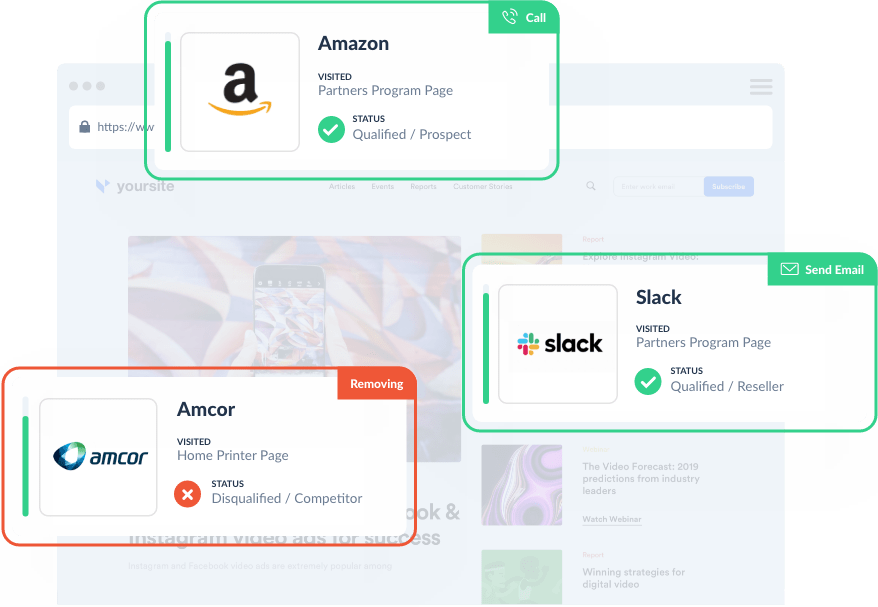
Leadfeeder: Offers automation tools for email campaign marketing, SMS campaigns, and overall marketing automation processes. It provides solutions to streamline marketing tasks and enhance customer interactions. This overall improves lead outreach and helps nurture

Adobe Marketo Еngage: A well-known and mature marketing automation tool with a full suite of features that help manage email campaigns and provide tools for sales teams. It offers a vast marketplace with numerous integrations across social media, CRM, and paid ads to optimize marketing efforts. A classic, Adobe Marketo Еngage has robust integrations with several integrations with common CRM software.

ActiveCampaign: Praised for its dedication to enhancing prospects’ experience through automation. It focuses on optimizing every aspect of the buyer journey by analyzing customer behavior in real time and taking appropriate actions automatically. This tool caters to businesses in various industries for both B2C and B2B marketing purposes. Active Campaign is the latest way to manage lead generation campaigns.
By leveraging these essential tools, businesses can reach new levels of efficiency, effectiveness, and innovation in their B2B marketing strategies.
Advanced Automation Tactics
Advanced tactics for B2B marketing automation go beyond basic automation functions to deliver highly targeted and personalized experiences to prospects and existing customers. These tactics leverage sophisticated techniques and technologies to optimize every stage of the marketing automation funnel and drive measurable results.
Tactic | Description |
Advanced Segmentation | Involves dividing the audience into smaller, specific groups based on demographics, firmographics, behaviors, or interests to tailor marketing messages and content, increasing engagement and conversion rates |
Automated Lead Scoring and Qualification | Assign numerical values to leads based on interactions with marketing materials. Advanced models use machine learning to predict conversion likelihood, prioritizing leads for sales follow-up |
Dynamic Content Creation and Delivery | Personalized marketing messages in real-time based on recipient data using dynamic content blocks and conditional logic for increased relevance, engagement, and conversions Dynamic content allows you to personalize your marketing messages in real-time based on the recipient’s demographics, behaviors, or past interactions with your brand. |
Integration of AI and Machine Learning | Utilizes predictive analytics to forecast outcomes, analyze trends, anticipate customer behavior, optimize campaigns, and allocate resources effectively By analyzing large datasets, AI-powered predictive analytics can help marketers anticipate customer behavior, optimize marketing automation campaigns, and allocate resources more effectively. |
Campaign Optimization and Testing | Offers A/B testing and multivariate testing capabilities to experiment with variables like subject lines, email copy, and calls-to-action for identifying effective strategies |
By implementing these advanced tactics for B2B marketing automation platforms, businesses can create more personalized, targeted, and effective marketing campaigns that resonate with their audience and drive measurable results.
Predictions for the Future of B2B Marketing Automation:
- AI-Powered Personalization: Artificial intelligence (AI) will continue to play a significant role in enhancing personalization capabilities within marketing automation platforms. AI-driven algorithms will enable businesses to deliver highly tailored and contextually relevant content and experiences to individual prospects, driving engagement and conversions.
- Predictive Analytics: Predictive analytics will become increasingly sophisticated, enabling businesses to anticipate prospect’s needs and behaviors with greater accuracy. By analyzing vast datasets and historical patterns, predictive analytics will enable businesses to identify trends, forecast outcomes, and proactively adjust marketing strategies in real time.
- Voice and Conversational AI: The rise of voice-enabled devices and conversational AI platforms will revolutionize customer interactions and engagement. B2B marketers will leverage voice search optimization, chatbots, and virtual assistants to deliver seamless and personalized experiences across multiple touchpoints, driving efficiency and convenience for prospects.
Working with the Pros for Seamless Marketing Automation
Grasping the tools and strategies of B2B marketing automation is undoubtedly important, but implementing these tactics successfully often requires a deeper level of know-how and experience. That’s where teaming up with seasoned marketing professionals can be a game-changer.
Take Altitude Marketing, for example. They specialize in crafting and executing comprehensive B2B marketing automation strategies tailored to each business’s unique needs. Their expertise goes beyond just selecting the right tools – it’s about seamlessly integrating these technologies into a cohesive strategy that supercharges lead generation, nurtures customer relationships, and aligns your sales efforts.
By leveraging the insights and support of experts like the team at Altitude Marketing, businesses can navigate the complexities of marketing automation with confidence. With the pros by your side, you can ensure that your marketing efforts are not only efficient but also impactful, driving tangible results for your bottom line.
Frequently Asked Questions
What is B2B marketing automation?
B2B marketing automation refers to the use of software platforms, software company tools, and technologies to automate and streamline marketing processes, tasks, and workflows in a business-to-business (B2B) context. These platforms enable businesses to automate repetitive marketing tasks, personalize prospect interactions, and analyze campaign performance to drive efficiency and effectiveness in their marketing efforts.
What are the benefits of B2B marketing automation?
B2B marketing automation offers several benefits, including increased lead generation and conversion rates, enhanced lead nurturing and buyer engagement, improved marketing and sales alignment, data-driven decision-making, and performance tracking.
What are some key trends in B2B marketing automation for 2024?
Some key trends in B2B marketing automation for 2024 include the integration of emerging technologies such as artificial intelligence (AI) and machine learning (ML), enhanced personalization and segmentation capabilities, the rise of omnichannel marketing automation, and a focus on customer experience and journey mapping.
Conclusion
The role of marketing automation has become increasingly vital for businesses seeking to drive efficiency, effectiveness, and growth in their marketing efforts.
Ultimately, the key to success lies in understanding the unique needs and preferences of your target audience, delivering value at every touchpoint, and continuously iterating and optimizing your marketing strategies based on feedback and performance data.
By using the power of B2B marketing automation tools and tactics, businesses can discover new levels of efficiency, effectiveness, and innovation, driving tangible results and sustainable growth in the years ahead.

